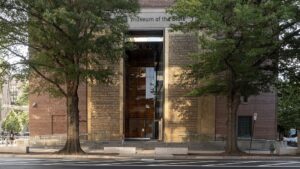The 3 Most Dangerous Lies Told at Trump’s Religious Liberty Commission
On Monday, President Trump’s Religious Liberty Commission held its first meeting at the Museum of the Bible in Washington (yeah, that’s a thing). Here at AHA, we’ve been keeping an eye on this group since it was announced last month. The commission’s stated purpose is to “safeguard and promote America’s founding principle of religious freedom.”
It’s interesting then that the vast majority of the members chosen for this commission represent a very specific strain of Evangelical Christianity – it’s a who’s who of Christian Nationalist media operatives. And one Rabbi. And Dr. Phil. And no representation for the 30% of Americans who identify as nonreligious.
The commission is set to conclude next July 4 (on the 250th anniversary of the nation’s founding), and will produce a report on the history and state of religious liberty in the nation. We have zero expectations that this commission will result in anything positive for the taxpayers who are funding it.
But that doesn’t mean it’s not worth paying attention to. Based on what we heard when we attended the inaugural meeting on Monday, it’s clear this commission is an attempt to rewrite our nation’s history in the image of Christian nationalists’ vision for this country: one in which they have full license to discriminate in the name of their faith.
Given this has flown under the radar for many reporters, we thought it important to lay out the lies this commission is telling.
1. The founders intended for America to be a religious nation.
Naturally, members of the commission cherry-picked quotes to make this argument. When they got to Thomas Jefferson, who was unequivocal when he authored Virginia’s religious freedom law in 1786 and said, “the opinions of men are not the object of civil government, nor under its jurisdiction,” they dismissed his perspective as representative of the founders’ intentions because he had spent too much time in France (not joking).
But the fact is, it wasn’t just Jefferson who worried about state religion – we seem to forget that the founders had just won a war for independence against a religious nation-state when they set out writing our Constitution (fun fact – we were the first government to embrace Constitutional religious freedom; a wholly American invention).
George Washington, though a Christian himself, famously wrote to a Jewish congregation in Rhode Island in 1790 that “all possess alike liberty of conscience.” This “liberty of conscience” was always understood to include the freedom to worship as one please–or not at all. As James Madison argued, if America is to protect the freedom of Christians, “we cannot deny an equal freedom to those whose minds have not yet yielded to the evidence which has convinced us. If this freedom be abused, it is an offence against God.”
So no, while the founders brought their own religious traditions to our young country, they did not mean for America to be a Christian nation, as Trump’s commission claimed on Monday.
2. Without religion, we have no morals.
Yeah, they seriously made this argument. And aggressively. In their framing, morals and virtue are critical for a healthy America, but neither exist without religion, and therefore, a healthy America can’t exist without religion. At times their language sounded like that of crusaders, with one commissioner saying: “we have a special battle today,” and Dr. Phil chiming in with: “we are in a cultural war, and not one of us can afford to be a non-combatant.”
Okay…victim complex much?
I’m not going to waste much time debunking this myth – it’s something so many of us who are nonreligious have had to defend time and again to people who think we’re heathens. It’s just a non-starter, as far as I’m concerned.
What I will offer is this: there are plenty of secular moral codes and value-based systems that offer a virtuous way to live one’s life – like humanism. Humanism may not be a religion in the way Trump and his allies conceive of it, but it offers a framework for being ‘good,’ much in the way this commission claims to care about.
3. Teaching religion to kids is not indoctrination.
Specifically, Trump’s commission argued, it’s “formation.” A distinction without a difference, if you ask us, especially if the powers in charge of deciding curriculum have ulterior motives, as this commission clearly does.
By emphasizing this distinction, this commission is attempting to lay the groundwork for more religion in the classroom. They want more prayer, more parental choice about what is taught in public schools (read: no DEI, no LGBTQ+ content), and religious charter schools funded by taxpayer dollars. The U.S. Supreme Court just blocked Oklahoma’s plan for religious charter schools, but based on the Senate’s recent embrace of an extreme House proposal to create massive tax shelters for millionaires and billionaires who give to private voucher schools, it’s clear that this administration wants to funnel dollars away from public schools to private religious schools that parrot their worldview.
With these lies, Trump’s Religious Liberty Commission is attempting to soften the public to the extremism of their agenda; forcing religion down Americans’ throats can’t be bad if 1) our founders wanted it, 2) we’re savages without it, and 3) properly educating our children demands it. It’s an unapologetically biased and discriminatory agenda masquerading as a patriotic revival of our nation’s dearest values.
And this is the heart of the problem: the “Religious Liberty Commission” has nothing to do with actual religious liberty. It’s a cheap, cynical misdirection to use a term that every American agrees with to push an agenda that is about the government teaching, promoting, and giving legal privileges to narrow and specific versions of Judeo-Christian religion.
That’s where the rubber hits the road for us. We believe that religious pluralism and freedom are bedrock values for our democracy, just not in the twisted, ahistorical way Trump and his commission of goons are arguing.

